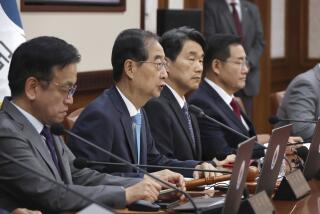Japan Freezes Aid to N. Korea Over Missile
- Share via
TOKYO — Outraged by a North Korean missile test that apparently sent a warhead flying over Japan and into the Pacific, Tokyo announced Tuesday that it is freezing food and energy aid to the Communist regime and withdrawing its offer for talks aimed at normalizing relations between the two countries.
Meanwhile, a North Korean delegation in New York failed to show up for talks scheduled with U.S. officials Tuesday, saying more time was needed for consultations with its government after the missile launch and raising the prospect that hermit-like, Stalinist North Korea will face a renewed period of international isolation.
And the Republican chairman of the House International Relations Committee, who had traveled to New York to attend the talks, said Tuesday evening that the missile firing and the lapse in the negotiations mean it is time for the Clinton administration to reconsider its North Korea policy.
Unless North Korea resumes negotiations and shows some progress, Rep. Benjamin A. Gilman (R-N.Y.) said, he does not expect Congress to approve continued funding for fuel oil the United States is supposed to provide North Korea in return for the regime’s agreement not to develop nuclear weapons. He added that U.S. food aid to the famine-plagued nation might also be in jeopardy.
“If they are going to be obstinate and still maintain they were essentially doing the right thing [in] testing the long-range missile . . . I think then the Congress would have to take a very strong stand,” he said.
Japan intends to lodge a protest with the U.N. Security Council and General Assembly, and will consider deploying reconnaissance satellites and an antiballistic missile defense system to protect itself against the North Korean threat, the Japanese government’s chief spokesman announced Tuesday evening after a meeting between Prime Minister Keizo Obuchi and senior officials.
Shortly after noon Monday, North Korea fired a new, two-stage missile, believed to be a Taepodong 1 with a range of up to about 1,250 miles. One stage of the rocket landed in the Sea of Japan and the other flew over the main Japanese island of Honshu and landed about 350 miles offshore in the Pacific, while the nose cone, which apparently did not contain an armed warhead, traveled still farther east before landing in the ocean, according to the Japanese Defense Agency.
The United States was able to film the ballistic missile for “several tens of seconds” after the launch using a reconnaissance satellite, according to an unnamed military source quoted by the daily Yomiuri Shimbun.
A U.S. military official in Washington told Associated Press that the North Koreans seemed to have deliberately aimed the missile over Japan. “There’s no reason to believe it didn’t go exactly where they intended it to go,” the official said.
The Japanese Transport Ministry announced that seven civilian aircraft, including five passenger planes, were flying in the North Pacific at the time and possibly passing near the landing point of the second stage of the missile.
Japan is particularly angered by the launch because it has made major efforts in recent years to improve relations with North Korea, sending more than $34.6 million in food aid since 1995 and pledging at least $1 billion to an international consortium that is building two nuclear power plants for North Korea as part of a 1994 deal that persuaded the North to abandon its plutonium weapons program. That reactor aid was frozen Tuesday.
Japan also succeeded in arranging visits home by some elderly Japanese wives who emigrated to North Korea, mostly in the late 1950s, together with their Korean husbands and had never been allowed to return. North Korea abruptly terminated the visits and in June unilaterally halted talks aimed at reestablishing diplomatic relations between the two because it was angered by Japan’s request that it discuss the fate of Japanese citizens allegedly kidnapped by North Korea.
Japan had left on the table its offer to resume negotiations at any time, without conditions, but that offer was withdrawn Tuesday.
The question of Tokyo’s military response to the missile firing, like all Japanese defense issues, remains delicate. A 1969 parliamentary resolution prohibits military use of space, but the launch prompted calls inside the ruling Liberal Democratic Party for Japan to strengthen its air defense systems and improve its satellite reconnaissance. Japan was not aware of Monday’s missile test until it was informed by the U.S. military, Foreign Ministry spokesman Sadaaki Numata confirmed Tuesday.
Times staff writer Craig Turner at the United Nations contributed to this report.
More to Read
Sign up for Essential California
The most important California stories and recommendations in your inbox every morning.
You may occasionally receive promotional content from the Los Angeles Times.













